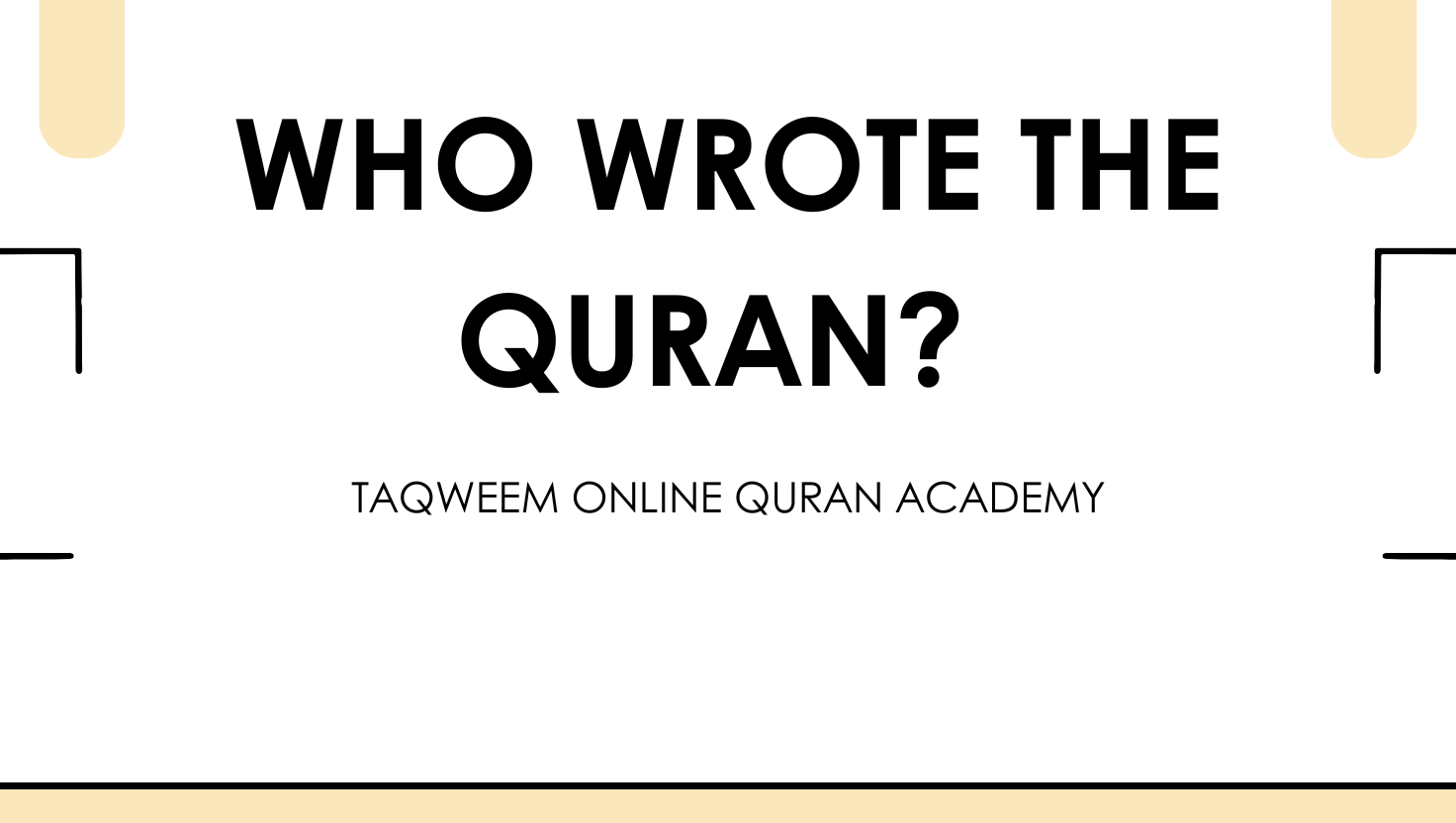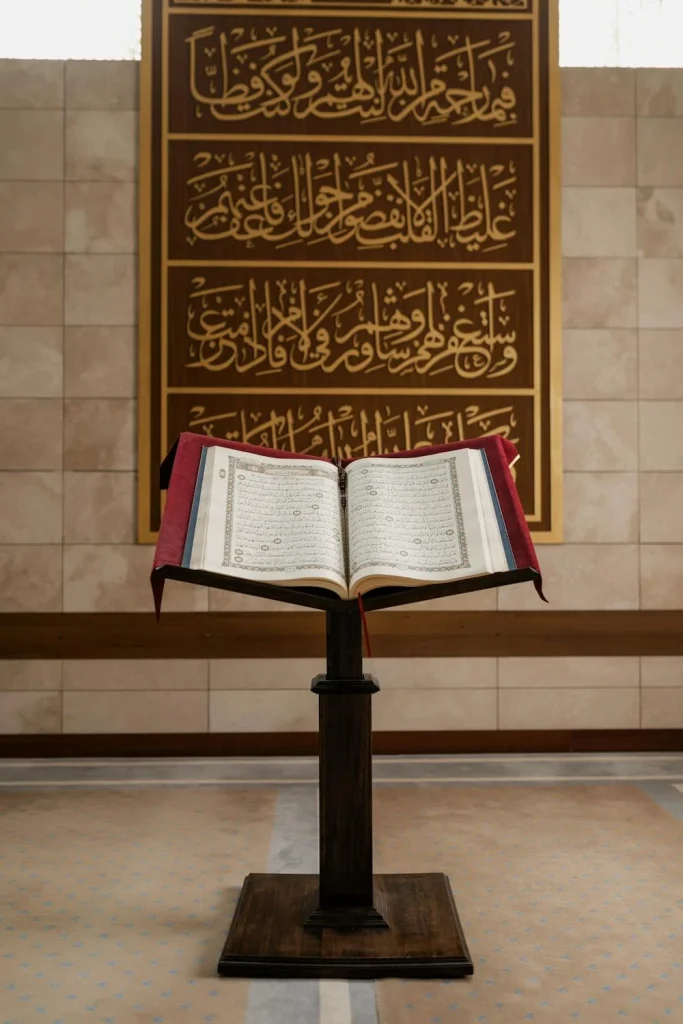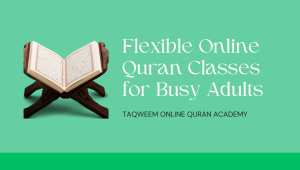There are some questions in life that sound simple but carry deep weight. One of them is: “Who wrote the Quran?”
I remember the first time someone asked me this. Their tone was casual, almost as if the Quran were just another book, like a novel you find on a shelf. But my heart tightened. Because the Quran isn’t just ink on paper. It isn’t authored in the way human books are. It is a living word — divine, timeless, and preserved.
So let me take you by the hand, and together, we’ll walk through the story of the Quran’s origin, how it was revealed, and how it has been preserved.
Table of Contents
ToggleThe Quran’s Origin — Not from Human Hands
The short answer? No human wrote the Quran.
The Quran is the direct word of Allah, revealed to Prophet Muhammad ﷺ through the angel Jibreel (Gabriel). Over a span of 23 years, verses were revealed in times of joy, hardship, war, peace, loss, and victory. Every moment of revelation carried weight, tailored to the reality Muslims faced.
It is important to pause here. Because when people outside Islam ask “Who wrote the Quran?” what they’re really asking is, “Was it Muhammad who wrote it?” But the Prophet ﷺ was unlettered. He did not read or write. The Quran itself challenges humanity:
“And you did not recite before it any scripture, nor did you inscribe one with your right hand. Otherwise the falsifiers would have doubted.” (Surah Al-‘Ankabut 29:48)
The Quran was spoken by Allah, carried by Jibreel, and placed directly into the Prophet’s ﷺ heart.
The Revelation Process — From Heaven to Earth
It began in the cave of Hira. Prophet Muhammad ﷺ, retreating in silence, reflecting on the world’s injustices, was suddenly met with the angel Jibreel. The angel embraced him and said a word that would change the course of history:
“Iqra” — Read.
From that moment, revelations would continue until the Prophet’s ﷺ last days. Sometimes Jibreel came like the ringing of a bell. Other times, he appeared in human form. And sometimes, verses descended in moments so heavy that even on a cold day, the Prophet ﷺ would sweat from their weight.
Each verse was not just heard, but memorized instantly by the Prophet ﷺ, then taught to his companions. They would repeat, absorb, and hold the words in their hearts. Some companions, known as scribes, would also write them down on parchment, bones, palm leaves — whatever was available.
The Quran’s first home was memory, not paper.

Who Compiled the Quran into a Book?
Now here’s where the story becomes practical. If no one “wrote” the Quran in the human sense, how do we have it today, bound in a mushaf (book)?
Abu Bakr’s Role After the Prophet ﷺ Passed
After the Prophet ﷺ left this world, many memorizers of the Quran (Huffaz) were martyred in battle. Umar ibn al-Khattab (RA) feared parts of the Quran might be lost if the Huffaz continued dying. So he urged Caliph Abu Bakr (RA) to compile the Quran into one manuscript.
Zayd ibn Thabit (RA), who had served as a scribe for the Prophet ﷺ, was given the task. With the meticulous care of a man who knew the weight of every letter, he gathered the Quran from written pieces and, most importantly, from the hearts of the companions who had memorized it directly from the Prophet ﷺ.
Uthman’s Standardization
Years later, during the time of Caliph Uthman ibn Affan (RA), Islam had spread far beyond Arabia. People in different regions were reciting the Quran in different dialects. To preserve unity, Uthman (RA) ordered several official copies of the Quran to be made from the original manuscript of Abu Bakr and distributed across the Muslim lands.
And here’s the miracle: every copy was identical. No difference in a single word.
Why the Question “Who Wrote the Quran?” Misses the Point
When someone asks, “Who wrote the Quran?” they’re imagining an author sitting at a desk, inventing stories, polishing drafts, revising sentences. But the Quran didn’t emerge from human imagination.
The Quran declares its own source again and again:
“Indeed, it is We who sent down the Qur’an and indeed, We will be its guardian.” (Surah Al-Hijr 15:9)
That promise of preservation is why, 1,400 years later, the Quran is unchanged. Not a single letter has been added, removed, or altered.
The Quran Today — Living in Hearts and Voices
One of the most astonishing aspects of the Quran is how it lives. Not just on shelves, but in people.
Millions of Muslims around the world — men, women, children — have memorized the entire Quran. Some are as young as seven years old. Ask yourself: could this happen with any other book? Could millions memorize thousands of pages word for word, in the exact same way, across continents and generations?
The Quran isn’t just preserved. It’s alive.
A Personal Reflection
When I recite Surah Al-Fatiha in prayer, I often think: these are the exact same words recited by the Prophet ﷺ in Makkah 1,400 years ago. The same words recited by Bilal (RA), by Aisha (RA), by Ali (RA). The chain is unbroken.
To me, this is the greatest proof of its divine origin. No author could achieve such continuity, such preservation. Only Allah could.
Quran Authorship & History – Optimized FAQs
Who wrote the Quran for Muhammad?
The Quran was revealed to Prophet Muhammad ﷺ by Allah through the Angel Jibreel (Gabriel). The Prophet recited the verses, and his companions memorized and wrote them down.
Who wrote the first Quran?
The first complete written compilation of the Quran was made under the caliph Abu Bakr رضي الله عنه and later standardized during the caliphate of Uthman ibn Affan رضي الله عنه.
How many authors wrote the Quran?
The Quran has only one author — Allah. It was revealed to Muhammad ﷺ and not written by multiple human authors.
Did Allah write the Quran?
Yes, in Islamic belief, the Quran is the literal word of Allah, sent down in Arabic to the Prophet Muhammad ﷺ.
Who wrote the Bible?
The Bible was written by multiple human authors over centuries, including prophets and disciples, under divine inspiration.
If Muhammad was illiterate, who wrote the Quran?
Prophet Muhammad ﷺ recited the revelations, and his companions, known as scribes, wrote them on parchment, bones, and other materials.
Quran vs Bible
The Quran is believed by Muslims to be the final, unchanged word of God, while the Bible is a collection of earlier revelations that, according to Islamic belief, have undergone changes over time.
Did Muhammad write the Quran?
No, Muhammad ﷺ did not write the Quran. It was revealed to him by Allah, and he conveyed it to his followers, who memorized and recorded it.
Who is the original author of the Quran?
The original and only author of the Quran is Allah, according to Islamic belief.
Who were the 4 people who wrote the Quran?
Several companions acted as scribes, but four notable ones were Zayd ibn Thabit, Ubayy ibn Ka’b, Abdullah ibn Mas’ud, and Ali ibn Abi Talib رضي الله عنهم.
Who printed the first Quran?
The first printed Quran was produced in Venice in 1537–1538, but it had many errors. The first accurate printed edition was published in Russia in 1787.
Who is the creator in the Quran?
The Quran clearly states that Allah is the sole Creator of the heavens, the earth, and all that exists (Surah Al-Anbiya 21:30, Surah Fatir 35:3).
If your heart is moved by the Quran, don’t let it just sit on a shelf. The best way to honor Allah’s book is to learn it, recite it, and live it.
At Taqweem Academy, our teachers guide students step by step — whether you’re starting with Tajweed, aiming to memorize, or simply want to understand the Quran more deeply.
Start your journey today. Let the Quran be not just a book you read, but a light you carry.







